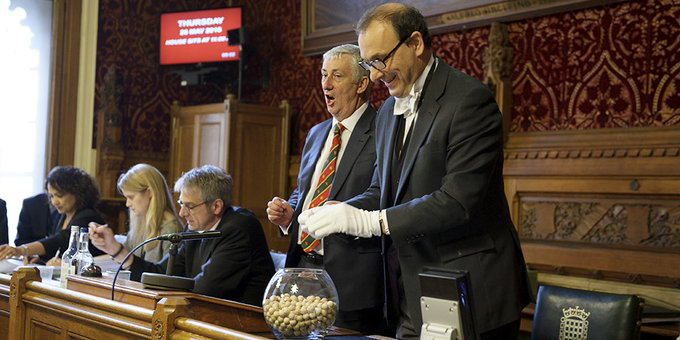How Private Members’ legislation improved local government social value
Chris Game assesses the efficacy of one of Parliament’s most antiquated procedures, the Private Members’ Bill, and finds that, though they have proliferated to little effect, in some notable cases, including local government procurement, they have instigated considerable reform.

Private Members’ bill ballot, 2016. Picture: UK Parliament/Parliamentary Copyright, reproduced with the permission of Parliament
One incidental phenomenon of this extraordinary period in our lives is the explosion in the quantity of free stuff around, and advertised as just that: ‘free stuff’. It takes me back a few years – memory-jogged by a recent report from the ‘neo-localist’ think tank, Localis, of which more later – to the heyday of ‘free stuff’ in the local government world.
Which in turn took me back, coinciding with MPs’ so-called return to work, to Parliament and a sometimes overlooked sphere of its work that every so often genuinely enhances public life – rather more than most Question Times, in-person or virtual.
I refer to Private Members’ Bills (PMBs) – the means by which non-ministerial MPs and peers can attempt to get their names into the statute books, or – much more usually – a one-line Hansard mention. I jest not – of the 386 PMBs introduced in the extended 2017–19 parliamentary session, just 15 received Royal Assent.
Like everything else about our Parliament – fabric, functioning, and obviously electoral system – the whole PMB business is decades overdue for overhaul and reform. Unsurprisingly, insofar as it featured at all in Photiadou and Dunleavy’s assessment of the House of Commons in the most recent Audit of UK Democracy, it was on the ‘Weaknesses’ side of the balance sheet, exemplified by a single MP’s being able to block a widely supported PMB that would have outlawed ‘upskirting’. Yet, almost despite itself, it regularly does produce seriously worthwhile law.
And there was one decade in which it excelled, creating a shelf of legislation that remains today hugely worthwhile – abolition of capital punishment, reform of law on abortion, homosexuality, divorce, theatre censorship, Sunday entertainment – and that was just the headliners. It was the 1960s, of course – as I was discovering a genuine interest in politics, had university essays to write, and became fascinated by this way of handling ‘conscience legislation’ – (PG Richards, Parliament and Conscience, 1970) – which is probably why I still pay sporadic attention to what goes on.
I admit, though, I had little idea of how the show-off Presentation Bill procedure had mushroomed. The Hansard Society counted 147 of them in that extended last session – except that there weren’t, in any physical sense. For all you need do is, well, present your proposed bill’s title – handfuls at a time, if you feel really shouty – to a sparsely occupied Friday Commons.
This still newish parliamentary session is already set to leave that 147 total standing. Imagine last Thursday, first day back at school, as the shoutiest boys (you can’t imagine women MPs bothering with this stuff, can you?) presented their holiday homework. Prominent Brexiteer Peter Bone managed 15 bills, but his supposed mate, Sir Christopher Chope – the upskirting bill objector, incidentally – left him almost wimpering with his (I think) 41.
Thankfully, you don’t even get to air what’s bothering you, because there’s no speech, no debate, and the things are frequently not even printed. Yes, there are occasional, vital exceptions – like the recent EU (Withdrawal) Bills sponsored by Yvette Cooper and Hilary Benn that sought to avoid a ‘no deal’ Brexit in the absence of the Withdrawal Bill’s ratification.
But exceptions they were. If you have a serious cause, a genuine knowledge of the subject and the deficiencies of the present legislation, plus ideally access to ‘expert’ advice and parliamentary drafting skills, then you don’t shout, but try a Ten-Minute Rule Bill and/or chance your luck in the Private Members’ Bill ballot.
This is a big parliamentary happening, at the start of each session. Most eligible MPs enter, their anonymised numbers inscribed on ping-pongy balls and pulled out of, obviously, a goldfish bowl for total transparency. The first 20 names then get, in reverse order, a guaranteed Friday slot in the parliamentary timetable to introduce and hopefully progress their chosen bill.
Of the 15 PMBs passed in the last session nine were these Ballot Bills. Most focus on a specific need, injustice or population group, like the Parental Bereavement (Leave and Pay) Act 2018, introduced by Conservative MP Kevin Hollinrake, who came eighth in the 2017 ballot, and which has finally just come into operation. Labelled ‘Jack’s Law’, after Jack Herd, whose mother, Lucy, led the campaign for the bill, it authorises a minimum of two weeks’ paid bereavement leave for the several thousand employed parents each year who lose a child under the age of 18 or have a stillbirth from the 24th week of pregnancy.
The difficulty in taking on an unsympathetic government on a politically big issue is illustrated by SNP MP Dr Eilidh Whiteford, who was seventh in the 2016 ballot. She tried using her bill to embarrass the government, already five years after signing the Council of Europe’s wide-ranging Istanbul Convention on Combating Violence Against Women, into actually ratifying it into UK law, instead of merely agreeing how jolly important it was and blocking it in the EU Council. Three years later: surprise! Shamefully, still unratified. However, with the Counting Dead Women project estimating at least 16 domestic abuse killings during the first three weeks of lockdown, Home Secretary Priti Patel is reportedly considering setting up a new cross-government taskforce on domestic abuse. So that’s sorted, then.
And back to the local government part of this blog’s theme, courtesy of Chris White, Conservative MP for Warwick and Leamington from 2010 to 2017. With beginner’s luck, White came third in the 2010 Private Members’ Ballot, and used it outstandingly, to introduce the Public Services (Social Value) Act 2012. Working ‘with the grain’ of both central and local government progressive thinking, it required councils and other public bodies to pay regard to ‘social impact’ – social, economic and environmental well-being – when making procurement decisions.
Some councils needed no convincing, but plenty did. Yet, really quite rapidly, social value advanced – from campaign slogan, through the development of Social Value Strategies, to statutory requirement, to an almost universally recognised consideration in dealing with both public and frequently private sectors.
The Localis think tank argues – not for the first time, but in greater depth – that the government should now go further. Councils should be required to produce publicly available Community Value Charters defining where social value offers would be best targeted, thereby aiding both commissioners and potentially bidding contractors.
Thanks significantly to Chris White, as the publication reminds us, we’ve come a long way from councillors and officers on the procurement side of a negotiating table asking, slightly self-consciously: ‘What about all the free stuff – sorry, the additional economic, environmental and social value?’ – and bidders frantically guessing what might be required to seal the deal.
This article gives the views of the author, and not the position Democratic Audit.
About the author

Chris Game is an Honorary Senior Lecturer at the Institute of Local Government Studies (INLOGOV) at the University of Birmingham.





 Democratic Audit's core funding is provided by the Joseph Rowntree Charitable Trust. Additional funding is provided by the London School of Economics.
Democratic Audit's core funding is provided by the Joseph Rowntree Charitable Trust. Additional funding is provided by the London School of Economics.